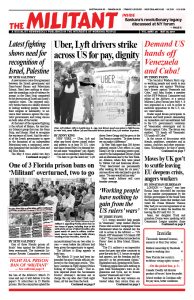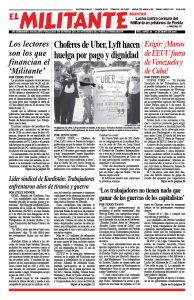LONDON — “Angry!” was how Rosina Jones described her reaction to yet another postponement by the British government of the break from the European Union that workers had voted for. Prime Minister Theresa May had just secured agreement at an EU summit to delay the deadline for leaving the EU until Oct. 31.
Jones, her daughter Trudi and grandson Duane were speaking with Communist League member Anne Howie on their doorstep in Llandeilo in rural South Wales. “They should have left the day after the referendum vote three years ago,” Trudi said. “What’s there to discuss? I wonder if Brexit will ever happen.”
Working people in Llandeilo have been hit by the same crisis of capitalism coming down on millions across the U.K. Many see breaking out of the EU as one step toward easing their burden.
“It’s the same in Tumble where I live,” said driver Michael Jones as he was picking up workers at the Dunbia meat plant in nearby Cross Hands. “My father worked for Corus, the steel manufacturer. The steel industry has been devastated. Gone are the wages, conditions and pension packages he got. People are working at minimum wage. Most of the workers are from Poland. Credit to them for looking for work. I’ve nothing against them — it’s the conditions I’m against.”
Anger among working people led to an electoral drubbing for both the Conservative and Labour parties in local elections across England May 2.
The Conservatives lost 1,300 council seats. With a hemorrhaging of the party’s former working-class support, the Labour Party lost 80 seats.
These losses deepen the government crisis, with daily calls for May’s resignation.
The Conservative Party, and to a lesser degree Labour, face continuing humiliation in elections for the European parliament that’s now set for May 23.
The two largest rulers’ parties are in negotiations over Brexit. Leaders of both favor staying in the EU and are engaged in talks over “Brexit-in-name-only” — formally leaving the EU while maintaining membership in most of its trade and other relationships — a deal they hope could win a parliamentary vote.
The ongoing political crisis is spawning new parties. Nigel Farage, formerly the leader of the UK Independence Party, left it because of the more right-wing, anti-Muslim axis of its new leader, Gerard Batten. Farage is now leader of the recently launched Brexit Party. He is seeking to win frustrated former Labour and Conservative voters and his party is now expected to get the biggest vote May 23.
On the flip side of the debate is Change UK, a party launched by the so-called Independent Group, a new formation of resigned Members of Parliament from both Labour and the Conservatives. It says it is “the center ground of British politics.” Change UK, along with the Liberal Democrats and sections of the Labour Party, promotes a “Peoples Vote,” a new referendum to force working people to keep voting on Brexit until they vote to remain in.
“The Conservative, Labour, Brexit and other parties all advance what they consider best for ‘Britain’ — by which they mean the British capitalist class,” Andrés Mendoza, Communist League candidate for the East of England constituency in the European parliamentary elections, said May 4. “The CL program starts and finishes with what’s in the interest of the working class in the U.K. and internationally. We stand for ‘Out Now!’ from the EU bloc as a way to focus and strengthen the struggles of the working classes against the British bosses, their state and parties. The propertied rulers in the U.K. are workers’ central adversary.”
Crisis fuels centrifugal forces in U.K.
Continued support for getting out of the EU among working people is fueling pressure in Scotland for a second independence referendum. The Brexit vote in Scotland saw a two-thirds majority in favor of remaining in the EU. Scottish National Party leader Nicola Sturgeon has spoken in support of a new Scottish independence vote if the U.K. quits the EU. But this would require the agreement of the government in London. Separation was defeated in 2014 by 55-45%.
Theresa May and Ireland Prime Minister Leo Varadkar took advantage of the April 18 killing in Derry of journalist Lyra McKee by the “New IRA” to announce talks. London and Dublin seek to avoid a “hard border” between North and South. This is what would happen if the U.K. — which includes the North — formally left the EU, while the South remains a member.
They hope to reconstitute the “devolved” Northern Ireland government, which was formed in 1999 after London transferred control over local affairs to it. This government hasn’t met for two years due to sharp frictions between the two central parties there, Sinn Fein and the Democratic Unionist Party.
Britain’s rulers are determined to maintain a United Kingdom, a vestige of their previous dominance, to offset their declining world role. The threat to the Union from Ireland’s growing economic interconnection, North and South, and with rival EU capitalist interests feeds these governments’ refusal to cut London any slack over Brexit.

